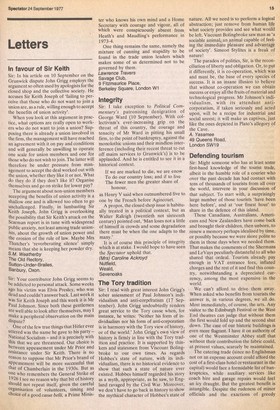In favour of Sir Keith
Sir: In his article on 10 September on the Grunwick dispute John Grigg employs the argument so often used by apologists for the closed shop and the collective society. He accuses Sir Keith Joseph of 'failing to perceive that those who do not want to join a union are, as a rule, willing enough to accept the benefits of union activity'.
When you look at this argument in practice, what options are really open to workers who do not want to join a union? Supposing there is already a union involved in the firm, the management will have reached an agreement with it on pay and conditions and will generally be unwilling to operate one scale for union members and one for those who do not wish to join. The latter will therefore be under pressure from management to accept the deal worked out with the union, whether they like it or not. What do they do if they don't like it? Organise themselves and go on strike for lower pay?
The argument about non-union members accepting the benefits of union activity is a shallow one and is allowed too often to go unchallenged. Finally, in lambasting Sir Keith Joseph, John Grigg is overlooking the possibility that Sir Keith's attack on the Scarman report is in tune with widespread public anxiety, not least among trade unionists, about the growth of union power and the erosion of the rule of law. Maybe Mrs Thatcher's 'reverberating silence' simply means that she is keeping her powder dry. S.M. Weatherby The Old Rectory, SuttonUnder-Brailes, Banbury, Oxon.
Sir: Your contributor John Grigg seems to be addicted to personal attack. Some weeks ago his victim was Elvis Presley, who was dead and couldn't answer back. Last week it Was Sir Keith Joseph and this week it is Mr Paul Johnson. Since both these gentlemen are well able to look after themselves, may I make a peripheral observation on the main dispute?
One of the few true things that Hitler ever uttered was the name he gave to his party — National Socialism — and it is precisely with this that we are threatened, Our choice is between appeasement under Mr Prior and resistance under Sir Keith. There is no reason to suppose that Mr Prior's brand of appeasement will be more successful that that of Chamberlain in the 1930s. But as one who remembers the General Strike of 19261 see no reason why that bit of history Should not repeat itself, given the careful organisation of volunteers, timing and Choice of a good casus belli, a Prime Minis ter who knows his own mind and a Home Secretary with courage and vigour, all of which were conspicuously absent from Heath's and Maudling's performance in 1973-4.
One thing remains the same, namely the mixture of cunning and stupidity to be found in the trade union leaders which makes some of us determined not to be governed by them.
Lawrence Travers Savage Club, 9 Fitzmaurice Place, Berkeley Square, London W1


































 Previous page
Previous page